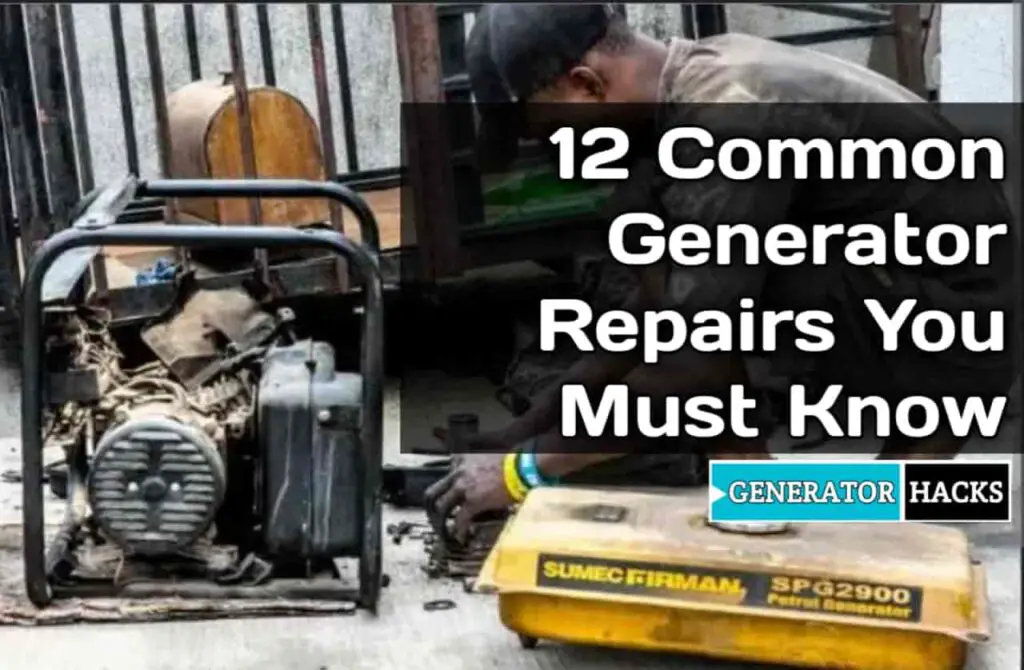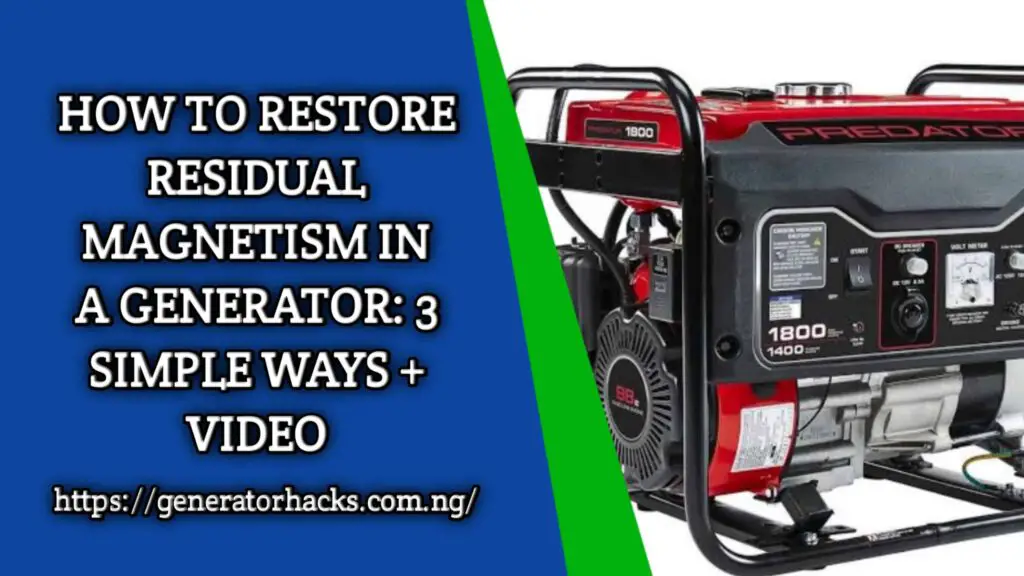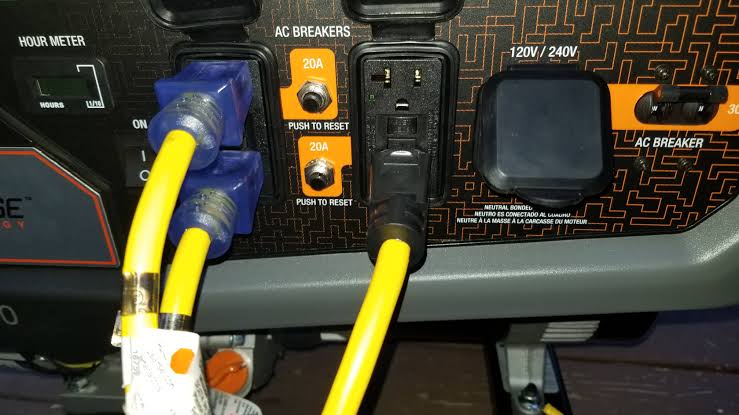As an Amazon Associate, we earn from qualifying purchases. This does not affect the price you pay or the quality of the products you buy. For more information, please read the full affiliate disclosure here.
A client asked me, “Why does my generator keep tripping off whenever I put on my load?” “What stops a generator from Running when you put on the load?”
You see, there are a lot of issues here, and thank goodness, generators aren’t like humans; in most cases, you can predict what’s causing a generator problem.
But don’t worry! Generator Hacks is here to help. We have been helping thousands of people like you over the years who have had issues with their generators.
Here, we will show you the best ways you can fix this issue. And if you’d like to receive more tips on how you can manage your generator effectively, subscribe to our newsletter using the subscription form below.
However, if your generator keeps shutting off after loading, different things can cause it, and it’s not necessarily because you loaded the generator.
Hence, we’ll look at the various reasons that can cause a generator to stop running after loading it and how possible it is to troubleshoot the problem and make it work effectively.
Let’s get started.
What Stops A Generator From Running When Put On Load
Here are some of the reasons or factors why generators shut down when put on load.
- Bad spark plug.
- The oil pressure is low.
- There isn’t enough gas, or there’s a blockage.
- The carburetor has a problem.
- Overloading.
- Generator at a very low speed.
1. Bad spark plug
In a previous article, “What Type Of Spark Plug Does Honda Generator EU2200I Use?” We listed the different types of spark plugs we have and how well they can work for a generator.
And, since we recommended the spark plug for Honda generators, you can use it for your generator if it’s the same plug size.
The problem with bad spark plugs is that you won’t quickly notice it’s a problem, but there are signs that you wouldn’t know unless you are a generator repairer or an engineer.
However, one of the signs is that your generator won’t run effectively. It might shoot or run slowly even before you load the generator.
2. Low oil pressure
If your generator’s oil pressure sensor is working properly, low oil pressure can be the cause. However, in most cases, it can malfunction in the case that there might be full oil and it will still be stripped off.
Most people disconnect the oil pressure sensor on their generator when they notice the problem keeps going on. And for some, they changed it, which might cost a lot of money.
3. There isn’t enough gas, or there’s a blockage
Here’s another problem that most people fail to understand. When there’s low gas in a generator, there’s no way it can power large appliances or even work for a long time.
And sometimes, low gas in the generator tank might not be the problem, but a blockage causes the gas not to flow adequately to the carburetor.
However, in this case, there’s always a sign that there’s not enough fuel before the generator stops working. The generator might be jacking off for at least some minutes.
4. The Carburetor has some fault
In the human body, when the heart develops faults, the whole body won’t be able to function effectively, causing us humans to stop working at times.
The same goes for generators. When your carburetor develops some faults, it will be hard for the generator to work as it is supposed to, especially when there’s a blockage of fuel or the carburetor’s choke isn’t the way it’s supposed to be.
Hence, it’s either you change your carburetor or you take it to a generator repairer to help you fix it.
5. Overloading
Overloading a generator is like overworking it, and it can cause it to stop working. When you use more power than a generator is designed to handle, it can cause damage to its mechanical and electrical components.
It’s more like you’re lifting a heavy weight; you can’t keep doing it for too long or else you’ll get tired and might even hurt yourself. The same goes for generators; if you keep using more power than they can handle, they’re going to break down.
6. Generator on a very low speed
Just like when you overload your generator, in this case, when your generator is running at a low speed, it’s not going to produce as much power as it should.
This can be a problem because when you put it on a load, the generator might not be able to keep up with the demands of the equipment you’re trying to power, and in return, the generator power switch might be turned off.
Furthermore, it’s more like trying to run a marathon when you’re not ready for it; you’re going to get tired quickly and won’t be able to finish the race. The same also goes for generators: if they’re running too slowly, they’re not going to be able to keep up and might stop working.
Additionally, this can also cause issues with voltage and stability, which might affect the equipment you’re trying to power, especially when they are large appliances that need a high-speed generator.
Therefore, after looking at the various factors that might cause your generator to stop working whenever you put on a load, it’s high time you diagnose the problem and fix it.
How Can You Fix A Generator That Stops When Put On Load?
Here are some ways to fix a generator that stops when put on load.
1. Check the spark plug
Firstly, you should check the generator’s spark plug. That means you check if the spark plugs are still in good condition, and if they’re not, it’s high time you change them.
There are different types of spark plugs you can find, and each of them has a limit to how long they can work under high pressure. However, if you check the plug and it’s not the issue here, you can move to the next step.
Although, if that’s the problem, you can use our recommended spark plug for high generator performance.
2. Is your generator engine oil at the gauge level?
Secondly, you should check your generator’s engine oil to see if it’s at the right gauge level and if the generator oil gauge switch is working properly.
If the generator engine oil is at the gauge level, then you move on to the next step, but if it’s not, you should buy one from a nearby store because, without gauging the generator, it will keep on stopping after a while.
However, you can also check out our generator engine oil buyers guide and some of the top engine oils we recommend for all types of generators.
3. Is there enough gas?
Sometimes, not enough gas in your generator’s tank can cause your generator to stop working after a while of loading it.
And in some cases, there might be a full tank and it will still be working. However, in this case, it happens especially when the fuel is dirty, which in turn causes a blockage on the fuel tap.
To know if there’s a blockage, remove your generator’s tank hose from the fuel tap and leave it on. If the fuel is running properly, then there’s no blockage.
4. Check your carburetor, especially the choke.
If your generator’s carburetor choke is not in the right position, it won’t even start. But at times, the generator choke might move back to where it’s not supposed to be; that’s why you should check it.
And after you do that, you should also check if there’s dirt in the carburetor. In this case, it can be one of the major reasons your generator is stopping.
Furthermore, if there are dirt particles in the carburetor, you should service the carburetor. And if you can’t service it yourself, contact a generator repairer or mechanic to help you.
5. Check if there aren’t any powerful appliances plugged in.
Overloading can cause the circuit breaker to strip off, making the generator stop working. And in most cases, you might forget to leave a powerful appliance plugged in without thinking of unplugging it.
And when you start the generator, because of that powerful appliance, if the generator isn’t powerful enough to power it, eventually it will stop working.
So, what you should do is walk around the house to check if there’s any powerful appliance plugged in, and if there is, turn it off and try running the generator again after you check all other factors that might cause your generator to stop working.
6. Check if the generator is running at a very low speed
Lastly, if you have checked all other factors and it persists in stopping after you load it, you should check if the generator is running at a very low speed. If it is, try increasing it a little bit, but not much, to avoid damaging your appliances over high voltage.
Conclusion
Loading a generator and having it stop working after a while can be frustrating, especially for homeowners and business owners like you who are urgently in need of the generator.
However, fixing such issues isn’t much of a problem, especially when a professional is around, but in cases where you can’t find any, first, diagnose the cause of the problem, then proceed to fix it using the methods we recommended in this article.
Before you go, you can check out some other articles if they are of interest to you.
- Best ways to fix generator spark plug
- Is it advisable for you to use car engine oil for your generator?
- Your generator won’t start? here’s how you can fix it
- Reasons your generator is blowing black smoke and how you can fix it.



